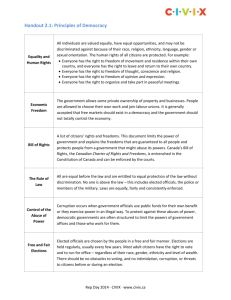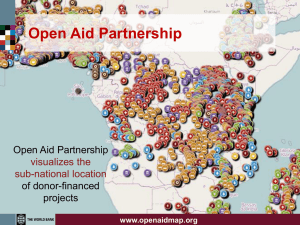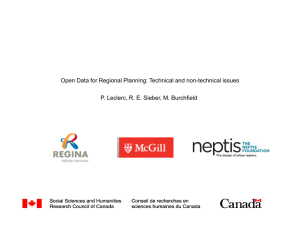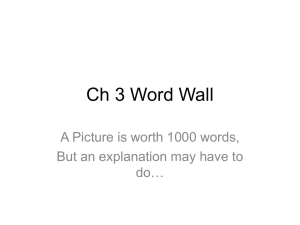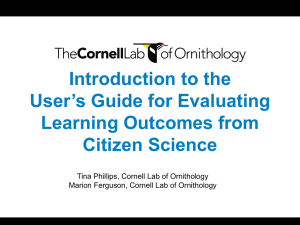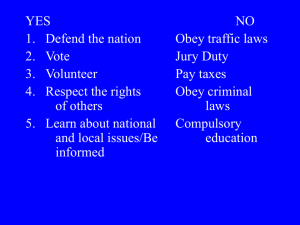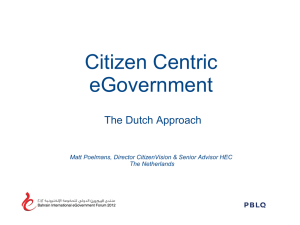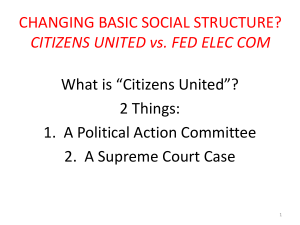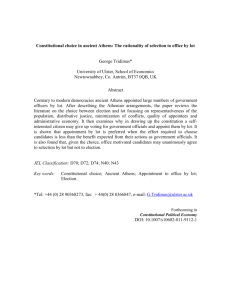Citizens United v. Federal Elections Commission
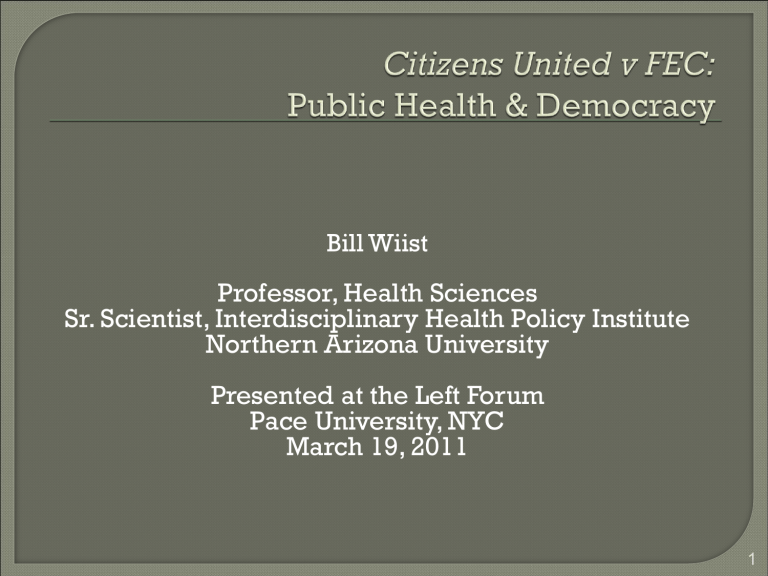
Bill Wiist
Professor, Health Sciences
Sr. Scientist, Interdisciplinary Health Policy Institute
Northern Arizona University
Presented at the Left Forum
Pace University, NYC
March 19, 2011
1
Research knowledge
Advocacy
•
•
•
•
•
•
•
• Lead industry
Tobacco industry
Asbestos
Food and beverage
Automobile safety
Child health
Healthcare reform
Firearm related injury
APHA Policies
Corporate tactics
Corporate or industry specific
2
A not-for-profit organization with contributions from for-profit groups
Produced film critical of 2008 presidential candidate Hillary Clinton
•
•
•
• “documentary” for on-demand satellite video to advertise on cable & network broadcast TV to broadcast within 30 days of primary election
Citizens United did not want to disclose funders
3
•FEC regulations & PAC procedures
•Burdensome: restrain political speech
•Overturned earlier laws and Court rulings
•1907-2002
•Previous prohibitions on corporate independent expenditures:
•a ban on free speech
•silence particular “voices”
•Disclosure requirements retained
4
Unlimited ---
•
Corporate independent expenditures
•
Directly from corporate treasury
•
For political advocacy advertising
5
No corporate disproportionate influence
Corporate natural personhood irrelevant
Unions have same rights
Contributions not a corrupting influence
Corporate lobbying already exists
6
Issues: examples
•
•
•
•
•
•
•
•
•
•
• worker rights environmental health & sustainability occupational safety & health access to reproductive services tobacco control alcohol regulation school health education motor vehicle safety firearms pharmaceuticals and medical devices health care reform
Opposition---corporations
7
Money in politics
Candidate Vulnerability
• District with corporation
• Incumbent voting record
Appointments to regulatory agencies
Judges
Disproportionate corporate influence
Human citizen participation
8
More money spent
• $4 billion in 2010 mid-term
Less reporting of sources
Lax government oversight
9
2010 election cycle spending by outside groups:
$294.2 million
vs $68.9 million in the 2006 cycle;
427% increase
~1/2 money spent ($138.5 million, or 47.1%) came from 10 groups
Public Citizen, January 2011
10
Group
Top 10 Spending Outside Groups, 2010 Election Cycle
Amount Spent Disclosed
U.S. Chamber of Commerce
American Crossroads
American Action Network Inc.
Crossroads Grassroots Policy Strats
American Future Fund
Americans For Job Security
SEIU COPE
Amer Fed. St, Cnty & Mun Employees
60 Plus Association
NRA America Political Victory Fund
Total $138,490,394
.
$31,207,114
$21,553,277
$20,935,958
$16,660,986
$9,610,700
$9,005,422
$8,340,028
$7,378,120
$7,096,125
$6,702,664
N
N
Y
N
N
Y
N
N
N
Y
Public Citizen, January 2011
11
53.9% of 308 groups provided information about their sources of money
Groups that did not provide any information about their sources of money spent:
• 46.1% the total spent by outside groups during the election cycle.
Public Citizen, January 2011
12
60 of 75 congressional contests with partisan power change:
• outside group spending favored the winning candidates
• In Senate contests:
7-to-1 money advantage
$85 million spent linked to the Citizens United ruling
$40 million from anonymous donors
Public Citizen, January 2011
13
U.S. House of Representatives
• voted 239-160 (January 2011) to eliminate public financing for presidential election
Laws effectively invalidated in 24 states
• Including challenges to disclosure laws
Increased Lobbyist influence
FEC: considers donation by cell phone
U.S. Representative asked business for wish list
Former Representative used in appeal of sentence
14
Add a 28 th amendment to the U.S. Constitution:
• Political speech
• Personhood
Fair Elections Now Act
Democracy is Strengthened by Casting Light on
Spending in Elections Act (DISCLOSE Act)
Shareholder Protection Act
15
Equal amounts of free broadcast time,
Ban political advertising if receive government money, hire lobbyists, collect most $ abroad,
Excise tax on contributions & expenditures,
Prohibit trading stock on national exchanges,
SEC disclosure of contributions,
Limit spending by foreign owned & contractors,
Rules against coordination
16
State Laws
• 16 passed laws
City Ordinances & Resolutions
• Pittsburgh, PA
Investigate Supreme Court Justices’ COI
• Impeach
17
¾ million people signed petitions supporting C
Amend,
100 events for January 21, 2011 anniversary,
8 U.S. Senators, 40+ Representatives endorse CAmend
Business coalition group formed
Local Chambers of Commerce withdraw
Shareholder resolutions
Bill to prohibit free university football tickets
Marry a corporation
Individuals incorporate
Public Citizen, Money and Democracy, Jan. 27, 2011; Dec. 2010
18
86%---big companies have too much power & influence in W, DC
38%---corporations fairly balance profits and the public interest
40%---too much power is concentrated in the hands of big companies
78%--- limit amount corporations contribute to influence elections
61%---Congress has done too little to regulate corporations
75%---corporations should obtain shareholder approval
73%---Congress should be able to limit corporate spending to influence elections
19
Public Citizen
Move To Amend
Free Speech for People
Progressive Democrats of America
Progressives United
Coffee Party
20
Reframe & Refocus
Curriculum revision
Research
•
• Election funding and PH policy
Lobbying & PH policy
Revolving door & PH policy •
APHA Policy
Collaborate
Policy development
Advocate
21
Large and immediate effect
Threat to public health policy
Threat to democracy
Fundamental across issues
PH research & training needed
Large, effective citizen movement
22
Wiist, W.H. (March 17, 2011) Citizens United, public health and democracy: The Supreme Court ruling, its implications, and proposed action. Amer J Public Health
DOI 10.2105/AJPH.2010.300043
Brezis, M. & Wiist, W.H. (2011). Vulnerability of health to market forces. Medical Care, 49(3): 232-239.
Wiist, W.H. (Ed) (2010). The Bottom Line or Public Health:
Tactics Corporations Use to Influence Health and Health
Policy, and What We Can Do To Counter Them; NY:
Oxford University Press.
Wiist, W.H. (2006). Public health and the anticorporate movement: Rationale and recommendations. Amer J
Public Health, 96 (8), 1370-1375.
23
Election Campaign Donation Information
Center for Responsive Politics http://www.opensecrets.org/
Follow the Money in State Politics http://www.followthemoney.org/
Action
Public Citizen http://democracyisforpeople.org/
Move to Amend http://movetoamend.org/?gclid=CNXOurCk06MCFQsSbAodEn3RbA
Free Speech for People http://freespeechforpeople.org/
Amend to Suspend http://pdamerica.org/iot/iotpage.php?page=Clean,%20Fair,%20Tra nsparent%20Elections
24
Corso RA. Very Large Majorities Of Americans Believe Big Companies, PACs,
Political Lobbyists and the News Media Have Too Much Power and Influence in D.C.
The Harris Poll #26, The Harris Poll, Harris Interactive; March 11, 2008. Available at http://www.harrisinteractive.com/vault/Harris-Interactive-Poll-Research-Very-
Large-Majorities-Of-Americans-Believe-Big-Com-2008-03.pdf
. Accessed March 30,
2010.
Pew Research Center for People and the Press. The 2004 Political Landscape. Part 7.
Business, Government, Regulation and Labor. November 5, 2003. Available at http://people-press.org/report/?pageid=756 . Accessed April 6, 2010.
Public Citizen Congress Watch (January 2011). 12 Months After: The Effects of
Citizens United on Elections and the Integrity of the Legislative Process.
Washington, DC: Public Citizen.
Public Citizen, Money and Democracy, Jan. 27, 2011; Dec. 2010
SurveyUSA. Results of SurveyUSA News Poll #16270. Americans Broadly in Favor of
Limiting What Corporations Can Spend to Influence U.S. Elections. (February 10,
2010). Available at http://www.surveyusa.com/client/PollPrint.aspx?g=05cabb5f-
599f-47a8-98fb-e3e254e425e4&d=0 . Accessed March 30, 2010.
25


